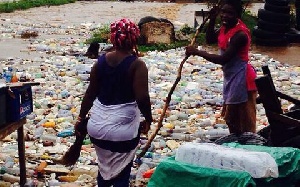 Recent rainfalls have exposed the country's poor handling of plastic wastes
Recent rainfalls have exposed the country's poor handling of plastic wastes
More than 50 basic schools in the Kumasi Metropolis, have participated in an environmental programme designed to create awareness on the harmful effects of plastics.
It comes in the wake of global efforts that deals with the plastic waste menace, especially its negative effects on the ecology and bio-diversity.
Organised under the auspices of the National Commission for Civic Education (NCCE) with sponsorship from the European Union (EU), the programme fell in line with the commemoration of the Commission’s ‘Citizenship Week’.
“A Clean Ghana, Our Responsibility”, was the theme.
Ms Margaret Konama, the Kumasi Metropolitan NCCE Director, speaking to the Ghana News Agency (GNA) on the sidelines of the programme, said many countries worldwide were considering a total ban or a restriction on the use of plastic products.
“Ghana should, therefore, make its stance clear on whether or not to do away completely with plastic products or enact relevant laws to limit their usage in order to save the environment,” she observed.
Plastics, she said, apart from not being bio-degradable, according to scientific research, have been found to contain toxic pollutants that tend to damage the environment, causing land, water, and air pollution.
Research scientists estimate that it could take hundreds or even thousands of years for plastic to break down - so the damage to the environment is long-lasting.
Ms. Konama said environmental protection was a shared responsibility, and entreated the pupils and students not to dump plastic waste haphazardly.
Mr. Stephen Asante, an Environmental Journalist, advised Metropolitan, Municipal and District Assemblies (MMDAs) to invest in the recycling of plastic waste.
He was not happy at the way plastic waste dumped in water bodies was killing aquatic life, and supported the call for a ban on the importation of plastic products.
He advocated the formation of environmental clubs in basic schools to help advance the cause for environmental protection.